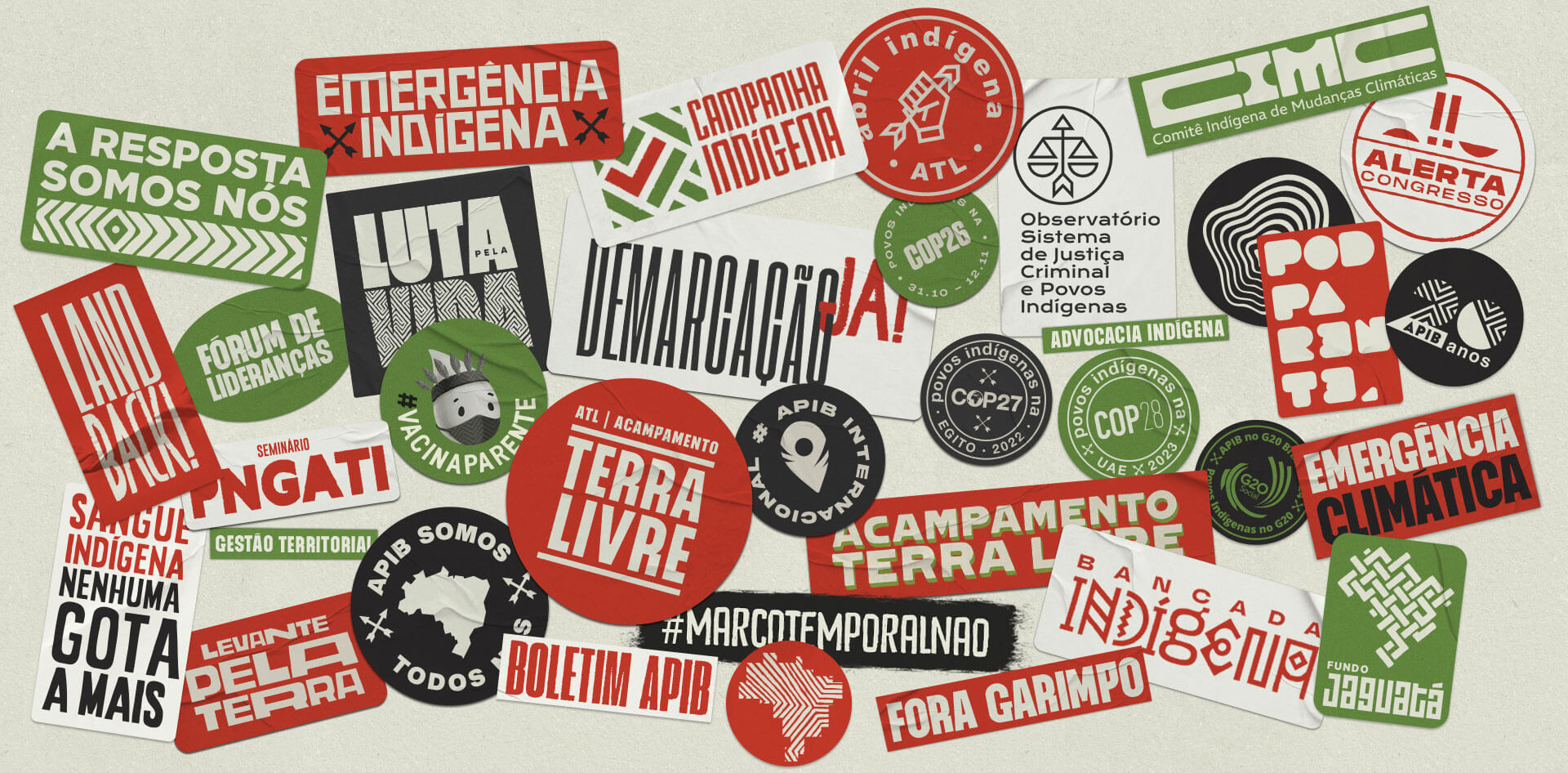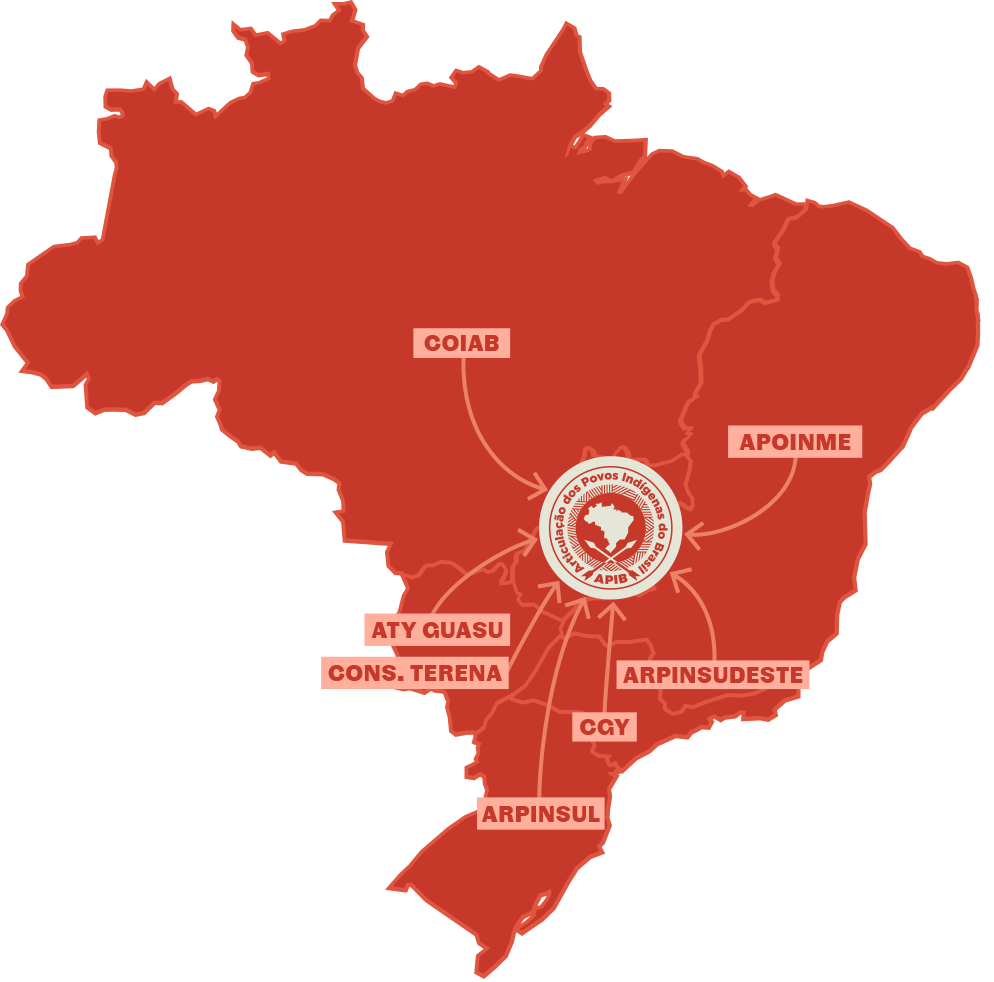The Articulation of Indigenous Peoples of Brazil (APIB) is an instance of agglutination and national reference of the indigenous movement in Brazil
The Articulation of Indigenous Peoples of Brazil – APIB was created by the indigenous movement at Camp Terra Livre (ATL) 2005.
ATL is our national mobilization, held every year, starting in 2004, to increase awareness over the situation of indigenous rights and claim from the Brazilian Government the fulfillment of its demands.
Apib is an instance of national reference of the indigenous movement in Brazil, created from the bottom up. It brings together our indigenous regional organizations and was born with the purpose of strengthening the unity of our peoples, the articulation between the different indigenous regions and organizations in the country, in addition to mobilizing indigenous peoples and organizations against threats and aggressions against indigenous rights.
Today APIB is once again here and fulfilling its role.


about apib
The Articulation of the Indigenous Peoples of Brazil – APIB is an instance of agglutination and national reference of the indigenous movement in Brazil, which was born with the purpose of:
- strengthen the union of indigenous peoples, the articulation between the different regions and indigenous organizations in the country;
- unify the struggles of indigenous peoples, the agenda of demands and the politics of the indigenous movement;
- mobilize indigenous peoples and organizations in the country against threats and attacks on indigenous rights.
Creation
The APIB was created during the 2005 Terra Livre Camp (ATL), the national mobilization that takes place every year, starting in 2004, to increase awareness over the situation of indigenous rights and claim from the Brazilian Government the fulfillment of its demands.
Mission
Promotion and defense of indigenous rights, based on the articulation and union between indigenous peoples and organizations from different regions of the country.
Goals
– Promote mobilizations and permanent articulation of the Indigenous Movement, in different regions and at the national level.
– Formulate and implement a Training Program for indigenous leaders and organizations.
– Assess and focus on the construction and implementation of specific and differentiated Public Policies aimed at indigenous peoples, in the different areas of interest: health, education, land, environment, legislation, sustainability, human rights and social participation and control.
– Develop an Information and Communication Program on the reality of indigenous rights, along with the bases of the indigenous movement, the State and national and international public opinion.
– Build and strengthen alliances with the international indigenous movement and other social movements, as well as partnerships with institutions and networks of solidarity and support for social causes, especially that of indigenous peoples.
– Guarantee the institutional and organizational infrastructure as well as the maintenance of the political and technical team necessary for the implementation of the APIB action plan.
Demands
ndigenist Legislation:
– Approval of the New Statute for Indigenous Peoples;
– Approval of the Bill that creates the National Council for Indigenous Policy (CNPI);
– rejection of anti-indigenous legislative initiatives (PL’s, PEC’s), which seek to reverse the rights guaranteed by the 1988 Federal Constitution.
– application of Convention 169 of the International Labor Organization (ILO) and the UN Declaration on the rights of Indigenous Peoples, which guarantee the right to free, prior and informed consultation on any matters that affect us.
– Justice: end of violence and criminalization against indigenous leaders and communities, as a result of the struggle for land.
Indigenous Health:
– creation of the Special Secretariat for Indigenous Health.
– recognition and training of the categories of Indigenous Health Agents (AIS) and Indigenous Sanitation Agents (AISAN);
– effective political, administrative and financial autonomy of Special Indigenous Sanitary Districts (DSEI’s);
Indigenous School Education:
– differentiated education, complete and qualified primary and secondary education, vocational education, access to higher education, with special programs and courses aimed at meeting the needs of indigenous peoples
Territorial management and sustainability:
– consolidation and implementation of the National Policy for Environmental Management in Indigenous Lands (PNGATI).
Participation and social control:
– equal participation in the different governmental bodies (commissions, councils and working groups) that discuss and guide the implementation of public policies aimed at indigenous peoples.
Structure
Acampamento Terra Livre (Terra Livre Camp)
The top instance of APIB is the Camp Terra Livre (ATL), the largest national indigenous mobilization, which gathers every year, on the esplanade of ministries, in Brasília-DF, the capital of Brazil, more than 1000 leaders from all regions of the country , under the coordination of the leaders of the regional indigenous organizations that conform APIB.
The ATL allows the exchange of such different realities and experiences, the identification of common problems, the definition of the main demands, and the deliberation on APIB’s programmatic axes and priority actions.
National Forum of Indigenous Leaders / Regional indigenous organizations.
To make the deliberations and referrals of Camp Terra Livre feasible, the leaders of APIB’s grassroots organizations, approximately 40 leaders, constitute the National Indigenous Leadership Forum (FNLI), which meets twice a year, with the objective of evaluating and defining the APIB action plan.
Permanent National Commission (CNP) of APIB
The execution of the APIB action plan is the responsibility of a Permanent National Commission (CNP) established in Brasília-DF, constituted by representatives of the regional indigenous organizations that conform the APIB.
The Action Plan consists of a series of actions that seek to carry out the mission, strategic objectives and central demands of the organization, such as:
– National Indigenous Mobilization (Camp Terra Livre);
– indigenous mobilizations and actions at the local and regional level;
– thematic seminars and training courses for indigenous leaders and organizations;
– meetings of the National Indigenous Leadership Forum (FNLI);
– exchange and solidarity actions between regions;
– meetings of the Forum in Defense of Indigenous Rights (FDDI);
– participation in initiatives for the articulation and mobilization of the international indigenous movement, mainly in Latin America;
– participation in international events promoted within the framework of the United Nations (UN), such as the Permanent Forum on indigenous issues;
– expansion and strengthening of alliances with other segments and social movements;
– articulation and monitoring of the actions of the Legislative and Judiciary branches;
– participation of governmental and non-governmental bodies that discuss indigenous rights.
who is part of apib?

The APIB was created by the Acampamento Terra Livre (ATL) of 2005, the national mobilisation which has taken place every year since 2004, to make visible the situation of indigenous rights and to demand that the Brazilian State attend to the demands and claims of indigenous peoples.
Today, APIB is represented in all Brazilian states through the regional organizations that compose it
APOINME
The Articulation of Indigenous Peoples of the Northeast, Minas Gerais and Espírito Santo (APOINME) is a non-profit regional non-governmental Indigenous Organization, created in May 1990, during the 1st Meeting of articulation of indigenous peoples in the East and Northeast regions of the country, held at the Pataxó Humhãhãe Indigenous Land, in Itabuna, Bahia.
The Organization acted for 5 years as an informal articulation, having as its main action the defense of human rights and the regularization of the indigenous territories of the region. With more than 20 years of existence, it works with a population of more than 213 thousand indigenous people, in territories and communities of 10 States within its coverage area (Alagoas, Bahia, Ceará, Espírito Santo, Minas Gerais, Paraíba, Pernambuco, Piauí, Rio Grande do Norte, Sergipe).
The Northeast, the first region to suffer the impacts of colonial action initiated in the 16th century, still has a strong and expressive presence of Indigenous Peoples.
The history of these peoples is marked by an intense process of resistance against the advance of capitalism, founded and maintained essentially in the exploitation of the work of the native and black populations, and in the usurpation of the land and its natural resources.
Among the indigenous movements aimed at recovering their self-determination and territorial control, the struggle for the Brazilian State to guarantee rights that allow them to live in accordance with their own forms of social organization, and the actions to retake their lands, stand out. In this context, indigenous women played a fundamental role, leading and supporting important movements and actions to achieve these goals, committing their forces and fighting skills and their ancestral knowledge.
Since the beginning of the first articulations between the Peoples of the region, women have figured and actively participated in important organizations, such as the Commissions of Indigenous Teachers (s), District Councils for Indigenous Health, etc., as it still occurs today. The very creation of APOINME was marked by relevant female performances, such as that of the leadership Maninha Xukuru. The struggle of indigenous peoples, intrinsically linked to territorial defense, is centered on the female Entity that Mother Earth represents as the great generator and guarantor of life.
APOINME’s action is therefore historically associated with the role of indigenous women in the scenario of struggles for guarantee and enforcement of rights.
ARPINSUDESTE
Articulação dos Povos Indígenas do Sudeste (ARPINSUDESTE)
ARPINSUL
The Articulation of Indigenous Peoples of the Southern Region (Arpin Sul) is an organization that since 2006 aims to develop and articulate the indigenous movement in the Southern region and seek to unite the Kaingang, Xokleng, Xetá and descendants of Charrua indigenous peoples, aiming to accumulate political forces to counter the avalanche of threats and aggressions from the anti-indigenous sectors.
Aty Guasu
Grande Assembléia do povo Guarani (ATY GUASU)
COIAB
The Coordination of Indigenous Organizations of the Brazilian Amazon (COIAB) emerged in 1989, having offices in the states of Acre, Amapá, Maranhão, Mato Grosso, Pará, Rondônia, Roraima and Tocantins.
The consolidation of the organized indigenous movement and the prospects for the future of the indigenous peoples of Brazil have been strengthened further since the 1990s, with COIAB having an important role in this scenario, both at the regional and national levels. It is estimated that in 1985 there were less than 50 indigenous organizations in Brazil. In 1990, this number made a leap for approximately 100 organizations, and in 2002, in the Amazon alone, we identified over 300 indigenous organizations¹ (Source: PDPI – Demonstrative Project for Indigenous Peoples).
Over the past two decades, there has been a progressive consolidation of indigenous participation in different areas of public policy that address issues related to indigenous peoples and in representative political bodies such as city councils, city halls, councils and state governments. The involvement of indigenous leaders in important thematic discussions at national and international levels, such as health and education, enabled greater training of leaders in the processes of discussion and intervention, especially at local and regional levels. The achievement of these steps made it possible for COIAB to become one of the main interlocutors of the indigenous peoples of the Amazon and Brazil vis-à-vis the Brazilian government and society.
During the period from 2006 to 2016, COIAB worked intensively in the construction of a short, medium and long term strategic planning that contemplated the main demands and desires of the indigenous movement, in a perspective of implementation by the organization’s management and for future management, always in the search for the strengthening and autonomy of indigenous peoples and organizations. This process involved several leaders in meetings of CONDEF – COIAB’s Deliberative and Fiscal Council, in COIAB Assemblies, in internal meetings of the Executive Coordination together with its partners / collaborators, in seminars and forums.
COIAB works to unify the actions of the Amazonian and national indigenous movement in a strategic way, seeking to focus on the main areas of activity of the indigenous movement, such as the right to indigenous lands, supporting the demarcations and ratification of reserves, reporting invasions and pressing disintrusion by the competent authorities, supporting indigenous peoples and organizations; in differentiated and culturally sensitive health for indigenous peoples, with social control by indigenous peoples, including the training and employment of indigenous health professionals and the recognition and incorporation of traditional knowledge and practices; the creation of conditions for the full participation of indigenous women in the indigenous movement, strengthening women’s associations and protecting their livelihoods; the strengthening of economic activities that ensure decent livelihoods through sustainable and low-impact economic options; the analysis of individual and systemic threats, developing and fighting for the implementation of culturally appropriate tools and methodologies for environmental planning, zoning of reserves and training of indigenous professionals; and intervention in public policies related to indigenous lands at all levels of government and even internationally, participating in work groups and other social control initiatives, claiming financial support for initiatives of interest to the indigenous movement and in the direct execution of actions in indigenous areas.
Comissão Guarani Yvyrupa
Guarani Yvyrupa Commission (CGY) is an indigenous organization that brings together collectives of the Guarani people from the South and Southeast regions of Brazil in the struggle for territory. The Commission’s founding act was a large assembly, which took place in 2006, where more than 300 political and spiritual leaders were present in Aldeia Peguaoty (in Vale do Ribeira / SP). The activities officially started on March 29, 2007 in a ceremony held at the 6th Chamber of the Federal Public Ministry in Brasília. Since then, CGY has been relying on its own Guarani modes of organization, where the elders and leaders are listened to to define strategies for political action in the fight for rights.
Guarani Yvyrupa Commission (CGY) is an organization founded and managed by Guarani leaders from different villages throughout the South and Southeast of Brazil, with the aim of nationally articulating the struggle of our people for the recovery of part of the territory that has been usurped gradually since the European invasion.
Yvyrupa is the expression used in Guarani to designate the structure that sustains the terrestrial world, and for us its meaning evokes the way in which we always occupy our territory freely before the arrival of whites, withouth the borders (municipal, stat) that separate our people today.
Terena Council
The Terena People’s Council was formed in 2012, and is located in the state of Mato Grosso do Sul.
Since the Paraguayan War, the indigenous peoples of the Pantanal have not met. After 177 years, the Terena leaders meet together with representatives of the Guarani, Kaiowá and Kinikinau people in the indigenous land Taunay / Ipegue, in the village Imbirussú on the 1st, 2nd and 3rd of June 2012.
The leaders of Aldeia Imbirussú, Aldeia Bananal, Aldeia Lagoinha, Aldeia Ipegue, Aldeia Água Branca, Aldeia Colônia Nova, Aldeia Morrinho, Aldeia Limão Verde, Aldeia Buritizinho, Aldeia Cruzeiro, Aldeia Taboquinha, Aldeia Brejão, Aldeia Lila, Aldeia Argola, Aldeia Passarinho, Aldeia Cachoeirinha, Aldeia Moreira, Aldeia Pilad Rebuá, Aldeia Água Azul, Aldeia Tereré, Aldeia Buriti, Aldeia Olho Água, Aldeia Mãe terra, Aldeia Urbana Marçal de Souza and Association of Indigenous Residents of the Taunay District; along with their elders, teachers, directors, indigenous scholars, health workers and their organizations.

get in touch
Executive Secretary
[email protected]
International Advisory
[email protected]
Communication Advisory
[email protected]
Project management
[email protected]
Legal Advice
[email protected]
